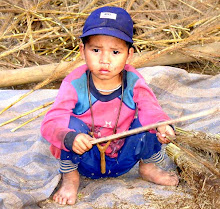One mission agency that collects funds to support native missionaries built a Bible college to train them before sending them out. They visited many villages asking them each to send students to come study and then they would be supported as native missionaries for a certain monthly amount. Each village could send two students for free. What happened? People who weren't even Christians were enrolling in the school. It was free. They could learn to lead religious services for another religion if someone was going to pay them to do it. They said all the right things and went through all the right hoops. We don't know if the administrators ever found out or if they were concerned about this problem.
In The Location a certain missionary worked with the pastor of one of the local churches. He noticed this pastor was always asking for things from all the foreigners who lived in town. He would ask for tiling for his house/church, instruments, a digital camera, a computer, a printer, a motorcycle, money to buy land, money for English school, money for his son to get married, etc. The missionary tried to give the pastor opportunities to work during the week so that he could earn enough money to purchase these things for himself. The pastor spent most of his time at home during the week without much to do other than going around and asking people for money. When he finally had an opportunity to work with a certain employer, he declined because he found other missionaries who were willing to just give him all the stuff he asked for without having to work. Now he has a computer at his house that he doesn't know how to use.
An Arab travel guide in the "Holy Land" noticed that many of the groups coming over on tours were American Christians who had little experience in other cultures. Many of them were nervous and excited about meeting a real live Muslim for the first time in their lives. And as a result, they would often try different subtle and some not-so-subtle ways to evangelize him. This man discovered that if he "converted" to Christianity he would get bigger tips than when he wouldn't convert. Consequently, every time he led a group that tried to share Christ he would act like he didn't know anything, pray a prayer of acceptance with them, and "convert" to Christianity. He was able to make a lot of money.
The last story is more of a "deceive those suckers" than a dependency story. But many more stories could be told.
It seems to me that the danger in the common mission agency practice of giving lots of things to poor people on the "mission field" is in creating a welfare state. You know what I'm talking about. People in our own country don't want to go out and get a job because it is easier just to live on government assistant checks. Then we have to ask the question of whether or not those assistance programs are working or just continuing and adding to the problem.
Most mission agencies (that are honest, and I believe most of them are honest) would be aghast at the thought that their programs are contributing to such a "welfare state" type situation. The problem is that we often don't realize how little it takes to do this. You see, if in the US a person got a government assistance check for $100 a month, it wouldn't be enough to live on. They would still need to go out and get a job. But half of that amount (what we might spend on one nice dinner) is more than enough for people to live on in many of the poorest countries of the world. It is not wrong to be generous, but we simply need to be aware of the potential negative situation we might be creating or contributing to. Are there better ways to help them help themselves rather than simply making them dependent upon us indefinitely?
Do you have a story? If so, please share.
Tomorrow I'll share some scriptures on the subject of dependency...
Sunday, March 8, 2009
Subscribe to:
Post Comments (Atom)










Um, do I have a story? You mean like someone living on the streets on a major city who chooses to be publicly humiliated for some fast cash as opposed to accepting an offer of help that involves some difficult choices, hard work, and accountability? Nah...
ReplyDeleteYes, Katdish, I know you DO have a story! Isn't it amazing that many of the same issues and principles that we face and apply overseas are still relevent for America?
ReplyDelete